James Richard Cook was an American author of novels and stories.
Stanley Albert Schmidt is an American science fiction author and editor. Between 1978 and 2012 he served as editor of Analog Science Fiction and Fact magazine.

James Henry Schmitz was an American science fiction writer born in Hamburg, Germany of American parents.

Telzey Amberdon is a fictional character in a series of science fiction short stories and two short novels by American writer James H. Schmitz, taking place in his "Federation of the Hub" fictional universe, presumably in the mid-4th millennium. She is introduced as a fifteen-year-old genius, a first-year law student, living on the human-settled planet Orado. Through interaction with alien psychic animals on a resort planet, she discovers that she has psychic powers. Upon her return to her home planet, her abilities are recognized by a mechanism at the spaceport reentry gate and she is effectively made an agent of the Psychology Service. A major pattern in the stories is the development of her powers. Eventually she teams up with the redheaded secret agent Trigger Argee. The series ends inconclusively; in the last story, a villain makes a duplicate of her, who gains a separate identity and name.

Louis Begley is a Polish-born Jewish American novelist. He is best known for writing the semi-autobiographical Holocaust novel Wartime Lies (1991) and the Schmidt trilogy: About Schmidt (1996), Schmidt Delivered (2000) and Schmidt Steps Back (2012).

Analog Science Fiction and Fact is an American science fiction magazine published under various titles since 1930. Originally titled Astounding Stories of Super-Science, the first issue was dated January 1930, published by William Clayton, and edited by Harry Bates. Clayton went bankrupt in 1933 and the magazine was sold to Street & Smith. The new editor was F. Orlin Tremaine, who soon made Astounding the leading magazine in the nascent pulp science fiction field, publishing well-regarded stories such as Jack Williamson's Legion of Space and John W. Campbell's "Twilight". At the end of 1937, Campbell took over editorial duties under Tremaine's supervision, and the following year Tremaine was let go, giving Campbell more independence. Over the next few years Campbell published many stories that became classics in the field, including Isaac Asimov's Foundation series, A. E. van Vogt's Slan, and several novels and stories by Robert A. Heinlein. The period beginning with Campbell's editorship is often referred to as the Golden Age of Science Fiction.
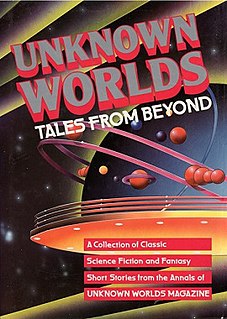
Unknown Worlds: Tales from Beyond is an anthology of fantasy fiction short stories edited by Stanley Schmidt and Martin H. Greenberg, the sixth of a number of anthologies drawing their contents from the American magazine Unknown of the 1930s-1940s. It was first published in hardcover by Galahad Books in 1989, though bearing a copyright date of 1988, and reprinted by Bristol Park Books in 1993.

The Demon Breed is a 1968 science fiction novel by James H. Schmitz, originally serialized in Analog in a shorter form as "The Tuvela". It was first published in paperback in the Ace Science Fiction Specials line, with a Science Fiction Book Club edition following in 1969. MacDonald & Co. issued a British hardcover the same year, reprinting it as a Futura paperback in 1974. A Dutch translation, Des Duivels, appeared in 1971, and a French translation, Race démoniaque, in 1973. Ace reissued its edition in 1979 and 1981. In 2001, Baen Books compiled the novel in its paperback omnibus The Hub: Dangerous Territory.
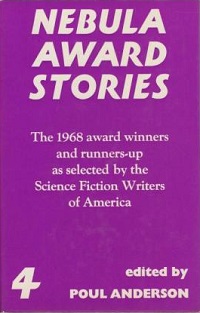
Nebula Award Stories 4 is an anthology of award-winning science fiction short works edited by Poul Anderson. It was first published in the United Kingdom in hardcover by Gollancz in November 1969. The first American edition was published by Doubleday in December of the same year. Paperback editions followed from Pocket Books in the U.S. in January 1971, and Panther in the U.K. in December 1971. The American editions bore the variant title Nebula Award Stories Four.

Nebula Award Stories 1965 is an anthology of science fiction short works edited by Damon Knight. It was first published in hardcover by Doubleday in 1966, with a Science Fiction Book Club edition following in October of the same year. The first British edition was published by Gollancz in 1967. Paperback editions followed from Pocket Books in the U.S. in November 1967, and New English Library in the U.K. in April 1969. The U.K. and paperback editions bore the variant title Nebula Award Stories 1. The book was more recently reissued by Stealth Press in hardcover in February 2001. It has also been published in German.

The Analog Anthology #1 is an anthology of science fiction stories and articles drawn from Analog magazine over its first fifty years of publication, edited by then-current Analog editor Stanley Schmidt. It was first published in paperback by Davis Publications in December 1980, and reprinted under the alternate title Fifty Years of the Best Science Fiction from Analog in 1982. A hardcover edition was issued under the alternate title Analog’s Golden Anniversary Anthology in 1981.
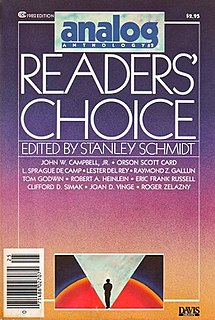
The Analog Anthology #2: Readers' Choice is an anthology of science fiction stories and articles drawn from Analog magazine, edited by then-current Analog editor Stanley Schmidt. It was first published in paperback by Davis Publications in January 1982, and reprinted later the same year under the alternate title Analog: Readers' Choice. A hardcover edition was issued by The Dial Press under the alternate title in March 1982.
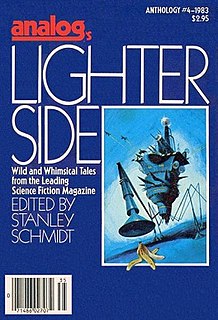
Analog's Lighter Side is the fourth in a series of anthologies of science fiction stories drawn from Analog magazine and edited by then-current Analog editor Stanley Schmidt. It was first published in paperback by Davis Publications in 1982, with a hardcover edition following from The Dial Press in January 1983.
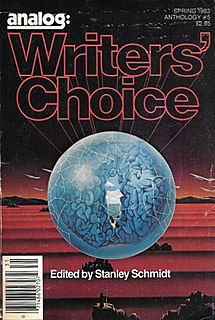
Analog: Writers' Choice is the fifth in a series of anthologies of science fiction stories drawn from Analog magazine and edited by then-current Analog editor Stanley Schmidt. It was first published in paperback by Davis Publications and hardcover by The Dial Press in 1983.
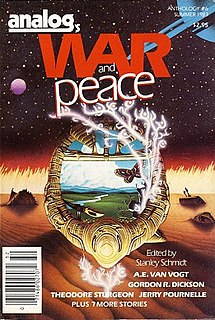
Analog's War and Peace is the sixth in a series of anthologies of science fiction stories drawn from Analog magazine and edited by then-current Analog editor Stanley Schmidt. It was first published in paperback by Davis Publications and hardcover by The Dial Press in June 1983. The hardcover edition bore the alternate title War and Peace: Possible Futures from Analog.
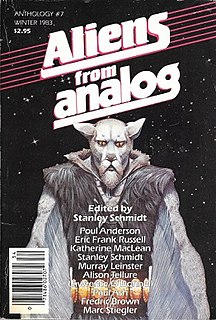
Aliens from Analog is the seventh in a series of anthologies of science fiction stories drawn from Analog magazine and edited by then-current Analog editor Stanley Schmidt. It was first published in paperback by Davis Publications and hardcover by The Dial Press in 1983.
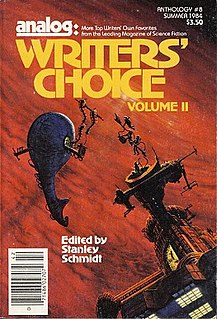
Analog: Writers' Choice, Volume II is the eighth in a series of anthologies of science fiction stories drawn from Analog magazine and edited by then-current Analog editor Stanley Schmidt. It was first published in paperback by Davis Publications and hardcover by The Dial Press in 1984.

Analog's From Mind to Mind: Tales of Communication is the ninth in a series of anthologies of science fiction stories drawn from Analog magazine and edited by then-current Analog editor Stanley Schmidt. It was first published in paperback by Davis Publications in November 1984, with a hardcover edition following from The Dial Press in December 1984 under the alternate title From Mind to Mind: Tales of Communication from Analog.

Analog's Expanding Universe is the tenth in a series of anthologies of science fiction stories drawn from Analog magazine and edited by then-current Analog editor Stanley Schmidt. It was first published in hardcover by Davis Publications for Longmeadow Press in 1986.
Arlan Keith Andrews, Sr. is an American engineer and writer of science fiction and non-fiction. He attended New Mexico State University, where he earned bachelor, master, and doctorate degrees in mechanical engineering. Since 1971, he has published three novels, three collections, over 30 non-fiction articles, almost 70 short fiction works, and multiple poems.

















